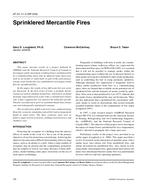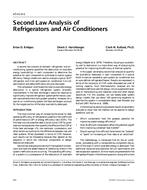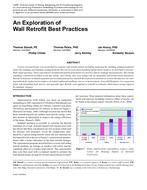The adoption of energy-efficient standards significantly cut the energy consumption in buildings by reducing envelope heat transfer and internal heat gain. These energy efficiency measures reduce not only the electrical load, but also the cooling load as well as the supply airflow rate. On the other hand, a minimum airflow rate is always required for all building types. As a result, additional reheat is typically required to maintain the minimum airflow set point under partial spacecooling loads for conventional air-handling units (AHUs) and may degrade the effectiveness of energy efficiency measures. The AHUs with return-air bypass (RAB) provides an alternative to reduce additional reheatingandovercooling at the minimum airflow rate with good space humidity control. However, because of insufficient performance data, the AHUs with RAB are still not widely applied.Thepurpose of this study is to investigate the energy and control performance of the AHUs with RABunderdifferent operating conditionsthroughsimulations. First, the AHU thermodynamic models and simulation approaches are developed, and then the system performance, including reheating and cooling loads and space humidity, is simulatedona pseudo-AHU.Thesimulation results reveal that the studied AHU with RAB can well maintain the desired space humidity without the additional reheating and overcooling as the space cooling load varies from 100% to 15% and space sensible heat ratio varies from 0.9 to 0.7.
Citation: ASHRAE Transactions, vol. 123, pt. 2
Product Details
- Published:
- 2017
- Number of Pages:
- 12
- Units of Measure:
- Dual
- File Size:
- 1 file , 3.9 MB
- Product Code(s):
- D-LB-17-019


